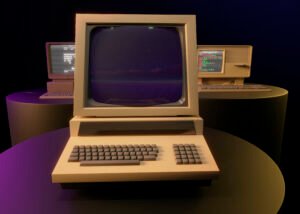Artificial intelligence is already bringing sweeping changes to many organizations. But is this a “flash in the pan”, a cool new trend that will vanish into obscurity? Or could a fundamental change be on the way that affects every one of us?
And how will this affect your career? Is AI just the latest step in the evolution of computer systems? Or is there more to it than that?
Here we answer those and more questions, and assess what may change.
Computing became pervasive around 50 years ago. It started with mainframe computers that automated processes in large organizations. Over time, as costs decreased and more systems became available, the use of computer systems increased. An “application backlog” became a real thing: there was too much work for the few, expensive IT resources to handle.

Then, along came mainframe personal computing. The idea behind this was to drain the application backlog by providing tools to allow non-IT employees to build their own systems.
Initial attempts worked reasonably well, but the tools provided were hardly easy to use. Employees were frustrated. “We need to talk to the computer in human language” was often heard, and that continues to today.
And suddenly, something of a breakthrough occurred — the invention of the personal computer. Now, anyone with sufficient budget could acquire and use programs that were less cryptic and obscure. The spreadsheet, and later the word processor, introduced new, accessible tools that anyone with limited training could use.
Rather than draining the application backlog, personal computing enabled the creation of new applications that many perceived as having real business benefits. But still people were saying “we need to talk to the computer in human language”.
More and more personal computer applications started to cause a new set of problems. None of the personal computers were interconnected with each other, and the organization’s mainframe computers. So along came networking to enable this communication, and eventually the Internet took this interconnectivity to new levels. New ways to communicate messages, news, shop, entertain, and access many other applications were enabled that would have been impossible before. More people became proficient in using technology to the point where “we need to talk to the computer in human language” was less often heard.

Along the way, the role of secretary, typewriters, letters, and visiting the shops all but vanished, or changed radically. And with smartphones enabling unprecedented access to the new ways of doing things, our whole social existence changed dramatically and quickly.
And then, technology innovation appeared to slow down. Nothing radically new was appearing. That is, until the dawn of widespread access to artificial intelligence tools.
Even given the changes described previously, they are likely to seem insignificant when considering the potential of artificial intelligence. This is not widely understood, despite artificial intelligence already being widely adopted.
In part 2 of this article, coming soon, we look at the potential of artificial intelligence and what it is likely to mean for you.

